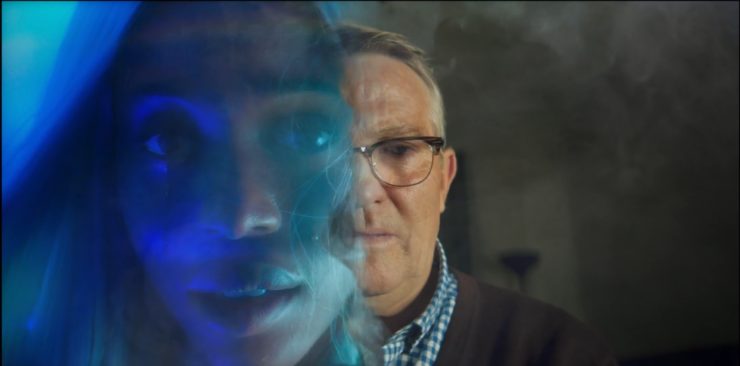This week on Doctor Who, creepy detachable fingers lead to a powerful immortal being, a prison, and a confrontation with human nightmares, both metaphorically and literally.
Welcome back to our Doctor Who discussion! Emmet and Sylas have had a very long day, and are ready to chat.
Sylas: The second I saw the title I knew this would be a creepy one. Which is funny because within the episode itself, the title is kind of an obscure moment, but it just says spooky, you know? No one is going to ask “Can you hear me?” for a non-spooky reason. Unless it’s a cell phone ad, anyway.
Emmet: I missed the cold opens.
Sylas: Me too! I hope they do more. I really like what it does for the pacing of the show. Which was particularly good in every regard this episode. A long slow burn with some things that an audience member might peg early on, and some deus ex machina bits at the end. Although they really aren’t deus ex machina. More like deus ex the Doctor, where she just takes the bad guys’ technology and turns it on them. Nine and Ten did that all the time, and I enjoyed seeing it again.
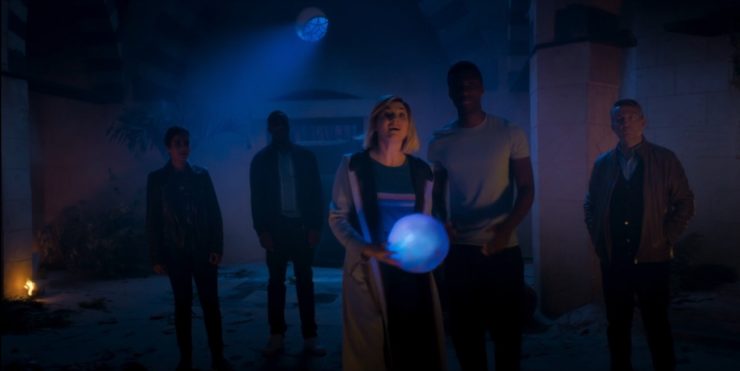
Emmet: I love how they used this very old school sci-fi plot to talk about mental health. It’s very similar to the story line with the Black Guardian and Turlough (during the Fifth Doctor’s tenure in the 1980s; Turlough first becomes a companion because the Black Guardian is using him to get at the Doctor). With the way the Black Guardian put him down so much, telling him he was worthless and cowardly, and that Turlough needed him.
Sylas: Right. I also really liked how Zellin manipulated the Doctor. You pointed out as soon as he appeared on screen that he seemed like a classic Doctor Who villain that way, and he interacts with her very similarly to the way those villains—the ones he later namedrops—did. Like the Celestial Toymaker, the Eternals, and so on.
Emmet: I’m really proud of myself for calling it. Because they all looked exactly like that. They were all creepy old men in weird heavy robes. And I liked Rakaya, his partner, because she was so fancy and elven.
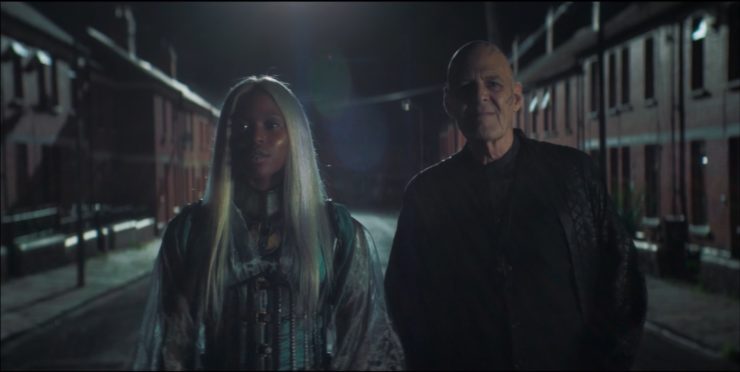
Sylas: It also reminded me of that one episode of Star Trek where they end up on a planet with a creepy old castle and skeletons and stuff, and they’re so confused as to why they’re supposed to be afraid of it. And there’s the alien lady who can turn herself into a cat.
Emmet: “Catspaw”
Sylas: Ugh. Of course that’s what it’s called.
Emmet: Except those two aliens didn’t like each other as much. But you’re right, because she was also fancy and in charge.
Buy the Book


Upright Women Wanted
Sylas: Yeah, a fancy lady who’s in charge and then a bald guy in dark robes who knows she’s smarter than him. The only difference is that Korob didn’t want Sylvia to go all darkside and get into human experiences. So she had to try to get with Captain Kirk instead. And “Catspaw” also tried to use the idea of the immortal beings from another dimension tapping into the human subconscious and weaponizing fear and distress.
Emmet: Oh my god you’re right. It’s just “Catspaw”! But Zellin and Rakaya are actually good at what they’re doing. Because the whole point of what happens in “Catspaw” is that Kirk and McCoy and Spock are all like… why would we be frightened of skeletons and images of witches?
Sylas: Mr. Spock, why am I suddenly in Macbeth?
Emmet: But instead we’re talking about mental health, and depression, and humanity facing their fears.
Sylas: For me, what makes this episode really great is that we’ve had several episodes now which talk about what we’re doing to the planet, and humanity refusing to take responsibility, and what will happen if we don’t acknowledge what is going on with climate change and how much trash we generate. And now we have an episode with super powered immortal beings who think humans are weak and pathetic because of all our emotions, especially negative ones like fear and guilt, and the Doctor stands up to them and tells them no, humans aren’t weak. They’re strong, because every day they get up and see their fears, their shame, their despair, and they face them. They persevere.
Emmet: It also makes a difference that they don’t tell us what exactly Yaz was dealing with or what was upsetting Tibo, because depression is like that. It doesn’t necessarily have a specific, easily-identifiable cause or trigger.
Sylas: Yeah, we know Yaz was being bullied but not the specifics, and that can come from a number of places, including the fact that kids struggling with things like depression or anxiety or what-have-you can often become easy targets.
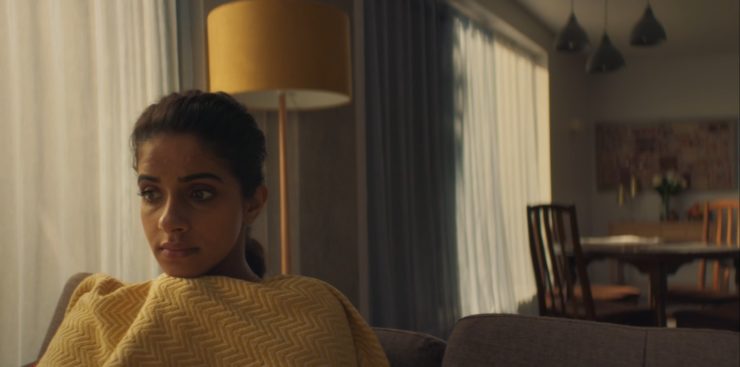
Emmet: Right.
Sylas: The show was careful with its wording, too. They used words like “mental health” and “mental wellbeing”. They avoided armchair diagnoses of people and didn’t drop any prejudicial words like “crazy” or anything like that. I loved that they used the Syrian hospital from 1380. Good on Doctor Who for reminding us that the study and understanding of mental health didn’t just start recently, or in the west, and that the Islamic doctors of that time were particularly enlightened in their treatment of patients.
Emmet: And they didn’t “very special episode” it. It’s a part of the story, but it’s also shown to be normal. We all deal with it, and the episode is about facing your fears and your struggles and knowing when you need help. That it’s good to get help and to share your pain with others when you need to.
Sylas: I mean, as someone who struggles with their own mental health, I felt very called out by Zellin and then very seen by the Doctor and by the way the episode showed us how the different characters engaged with their mental health stuff. It made me feel braver, I guess. Like, “I do that too!” you know? I don’t usually want to give myself credit for things, but I go to a therapist and I spend time on myself, and working on my mental health. This episode tells me that I should be proud of that.
Emmet: And they showed all sorts of different experiences with the different characters. Like with Graham being afraid his cancer is going to come back. As a person who has just been through a major health issue, I was like yeah, this is exactly it. You’re constantly worried that something could go wrong again, because something has.
Sylas: And you have to keep watching it, and even if you keep getting good news, it’s still there, in the back of your mind.
Emmet: It could come back, or there could be complications. You’re aware that it’s there. It follows you.
Sylas: And you should talk to the Doctor about it.
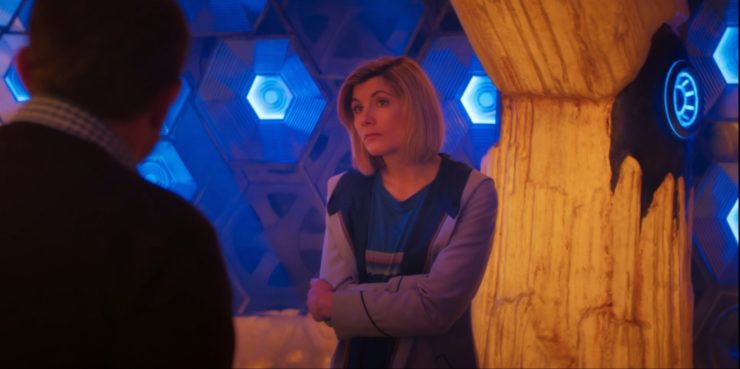
Emmet: It’s interesting to me that this version of the Doctor is worse at that kind of stuff. She’s more cognizant of the fact that she should be present and helpful and listen to her friends, but I feel like if Graham had said this to the Tenth Doctor, or the Eleventh Doctor, or the Twelfth Doctor, they would all have been sympathetic and would have had something helpful to say.
Sylas: We would have gotten one of those little Doctor speeches. This Doctor gives fewer of them, and only when she’s not really thinking about giving them. She’s a bit less grandiose. Like not un-grandiose, certainly, but she is a bit more subdued, comparatively.
Emmet: And she acknowledges her own shortcomings in all this stuff. She says she’s “socially awkward.” She’s aware of her difficulties in relating to people. So we also get to glimpse a moment of the Doctor facing her fears, in addition to all the companions. She has that moment with Graham, and also her brief panic at being left alone in the TARDIS at the start of the episode.
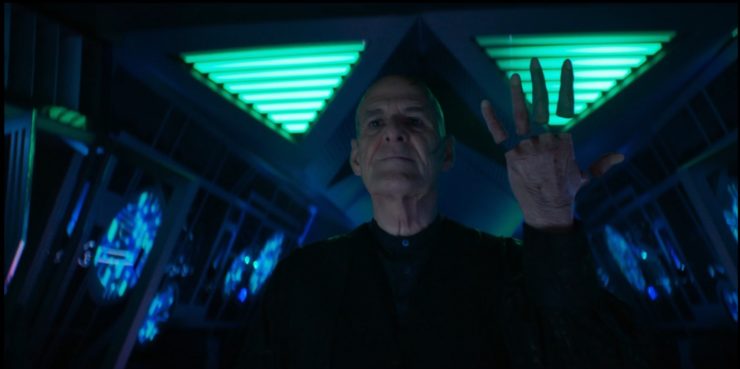
Sylas: Okay but on a different note, why are hands so nice but when it’s just fingers it is so gross?
Emmet: Yeah, I don’t know. But it’s true. Especially when you’re thinking about sticking fingers in ears. Just two body parts that don’t go together.
Sylas: Extra-dimensional wet willies.
Emmet: Ew…
Sylas: Except not quite because because the wrong end goes in the ear. The severed end, not the fingertip.
Emmet: Which I’m still kind of confused by. I mean, I love it because it’s so absurd. That’s what I want from Doctor Who. I want to know who pitched “and then his fingers detach from his hands and go off into other people’s ears via magic levitation.”
Sylas: It’s the kind of weird horror you’d see in a Doctor Strange comic or something. I’m just trying to decide if it not being fingertip makes it better or worse. But what is interesting about it is that it makes the bad dreams the companions have seem so normal and real in comparison. Like obviously they’re sad and scary, but they’re not the kind of nightmares that stretch out into the absurd. They’re concrete for the most part, even Ryan’s makes perfect sense given what he’s been through.
Emmet: Oof, Ryan’s fear of not being there with his friends, and his fear of changing, or having them change, reminded me of when I studied abroad in college. It sounds so silly, of course, because they say once you study abroad you always talk about studying abroad and how it changes you. But I remember very distinctly, coming back after a year of being away and thinking I’m very different from my friends right now. That gap doesn’t last forever, but it is very jarring when you encounter that.
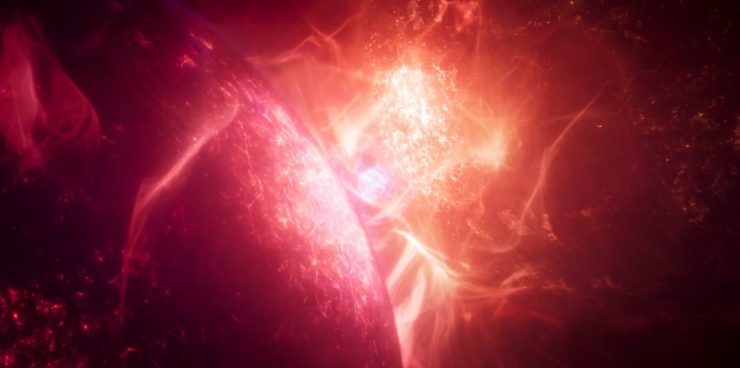
Sylas: And that was just a relatively safe year in another country, not a series of impossible adventures across the stars that you’re never quite sure you’re going to survive. And because this is new Who, they’re addressing that. I mean it wasn’t Moffat’s thing but Russell T Davies really brought that element of family, and remaining connected to home, into Doctor Who when he started the show back up again.
Emmet: Yes, and he talked about this in A Writer’s Tale. Davies’ whole thing was that it always seemed so wrong to him when watching Classic Who that you never got to find out how it affected anyone who was left behind, and he said that as long as he was in charge you’d never not see that aspect. Because it does affect people’s lives, in huge ways.
Sylas: He even managed to work the classic characters into that narrative by bringing back Sarah Jane in “School Reunion.”
Emmet: And we started the episode by reiterating the idea that the Doctor is so bad at getting people back home when she says she’s going to. But now they’re acknowledging that even if the Doctor does get you back (relatively) on time, you’re still different. You’ve changed.
Sylas: And you can’t exactly keep coming back to moments shortly after you’ve left, because then you’d age and it would eventually show. But with Ryan I was thinking about how the current campaigns around things like depression and suicide ideation or suicidal thoughts is about encouraging people to reach out, but also reminding us that sometimes we have to extend a hand to those who are struggling first. Because depression and anxiety lie to you, they tell you not to bother other people, that you’re not worthy of help. So even if someone says they want to hear from you, you might not believe it.
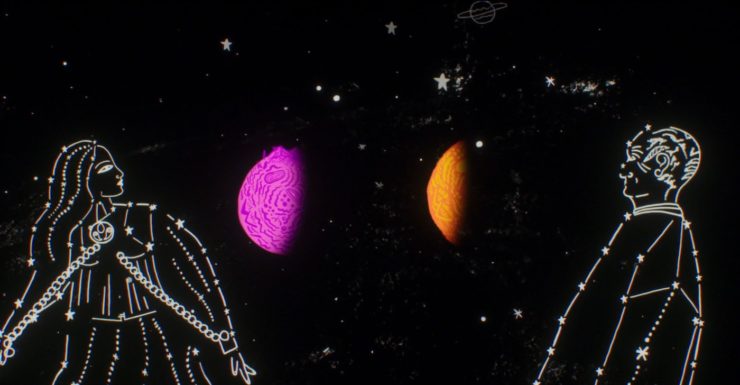
Emmet: It’s true.
Sylas: So there was such a visceral horror there, for me, to imagine a friend who was struggling so much who did manage reach out, and then to have missed the calls. And for months. That was really upsetting.
Emmet: But the good thing about Ryan is that he did realize, and he knew better than just to call back. He went over there immediately with food, and was fully there for his friend. And part of being there meant seeing the state of the flat and seeing how Tibo was acting, and figuring out what was really going on.
Sylas: That’s true. When he was there, he was fully there. Even the supernatural Doctor Who-y bits with Zellin showing up in Tibo’s room played into that idea, because he was afraid Ryan would laugh, but Ryan didn’t. And sure, he was prepared for that kind of thing because of his time with the Doctor, but I really believe that he wouldn’t have laughed anyway.
Emmet: Oh, for sure.
Sylas: Like, there’s a reason he’s a companion. And I think that the episode is trying to teach us that, too. To take people seriously and to believe them when they tell us their experience, whether or not it matches up to our own. It reminded me of the show Sense8, when Nomi explains the connection of the cluster, and Amanita just believes her, because she’ll always believe Nomi. And that’s what we need to be for each other.
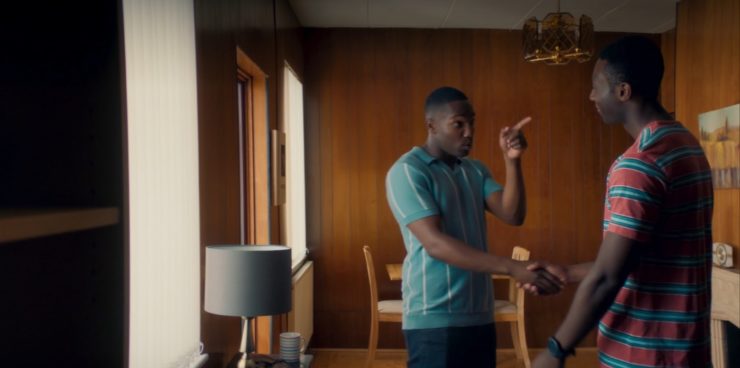
Emmet: I liked how Tibo found a group setting, with other men, for his therapy. It’s a very specific space, tailored to him.
Sylas: Support groups are so important, and can sometimes be more accessible to people than individual therapy. And men in particular are taught so early and so stridently that they’re supposed to bottle up their feelings and be stoic and “strong” all the time. So it means a lot for someone like Tibo to have a safe space with other men, and to see that people he relates to are like him in this, too. And that it’s okay to be that way.
Emmet: The theme of listening and believing is also true in Yaz’s situation. The cop doesn’t tell her that the things she’s going through, the bullying and such, aren’t real or aren’t significant. She just tells her that it’s worth it to push past them, that there are things on the other side of that worth fighting for.
Sylas: And now we have a sense of why Yaz became a cop, which is a beautiful origin story.
Emmet: I do wonder if Yaz will stay a cop, though.
Sylas: There’s definitely some setting up here going on. I do feel like there’s more to Yaz’s story. I guess that “anniversary dinner” was for the day that she came home after running away and maybe doing “something worse.” Did you think that was what it was for?
Emmet: I guess so? It was a little unclear to me. But if it was, I still think there’s more to why Yaz was running away than we know yet. It feels like there’s something big coming for her.
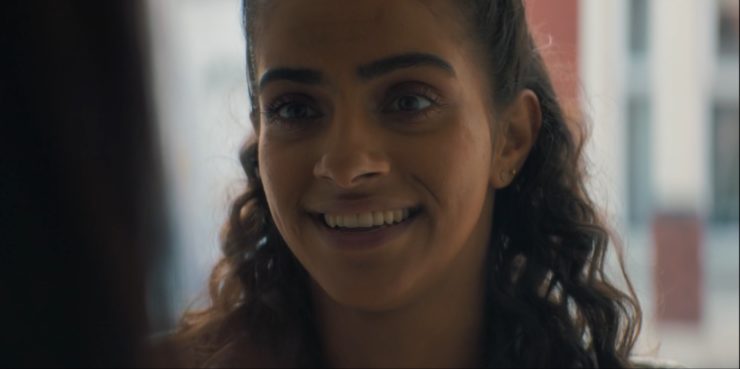
Sylas: And maybe Ryan, too. I know there’s been speculation that Ryan might be leaving now that Tosin Cole been cast in the AMC show, 61st Street. And he’s certainly talking the way companions do when they’re reaching the end of their time on the TARDIS. Do you think Yaz and Graham will go with him?
Emmet: I mean, there’s still no guarantee either way. These things don’t always interfere, it depends. It would be nice if Yaz stayed around. I would think that Graham wouldn’t want to stay if Ryan left—part of why he does this is to do things with Ryan. But I could see Yaz hanging on.
Sylas: Or everyone could stay and we’re all jumping the gun. Which is fine with me. It was just the things Ryan was saying that really caught me. Lots of companions have started their exit from the TARDIS that way, as they start to realize that their lives are running away without them.
Emmet: But can we talk about how the Doctor didn’t erase Tahira’s memory? So we’ve had the episode where she does it to Ada Lovelace and to Noor Khan, and then she doesn’t do it to Nikola Tesla or to Thomas Edison, and then this episode she doesn’t do it to Tahira either. So why did she feel the need to do it to Lovelace and Khan? I guess you could make an argument that if Ada Lovelace knew all this stuff it could affect history, since she’s an inventor? But that still doesn’t explain why she needed to do it to Noor Khan.
Sylas: But if she’s worried about Lovelace’s effect on history, she should be equally worried about Edison and Tesla.
Emmet: It doesn’t make any sense at all.
Sylas: I really loved Tahira’s character though, and I love how they brought the theme of facing your fears and your demons to a literal conclusion, with the fact that the Chagaskas were created from her nightmares, and by facing her fears she literally learns to control them. And she had the Doctor and friends at her back to help her do that. I loved it, and I love how flabbergasted Zellin was by it. It really pulled through the theme that facing one’s fears is this incredible superpower humans have, and, just like the Doctor’s smarts and resourcefulness, it is something that these self-styled “superior” beings just can’t understand.
Emmet: I like how the Chagaskas were giant monster sloths. Sorry, you were being serious and smart, but I needed to bring it back to the important facts. Sloth monsters.
Sylas K Barrett is going to start visualizing his fears as sloth monsters he can tame to do his will.
Emmet Asher-Perrin has been having some pretty weird nightmares lately, and will now keep thinking it’s because there are fingers in their ears.










